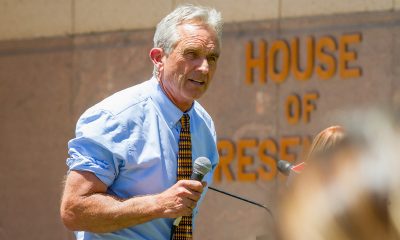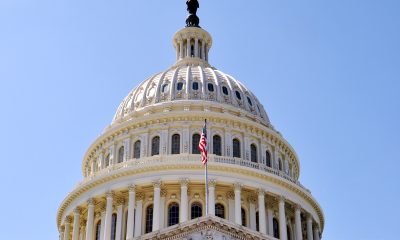Eastern Europe
LGBTQ Ukrainians weigh in on Russian aggression
Several activists bluntly categorized crisis as ‘Biden’s war’
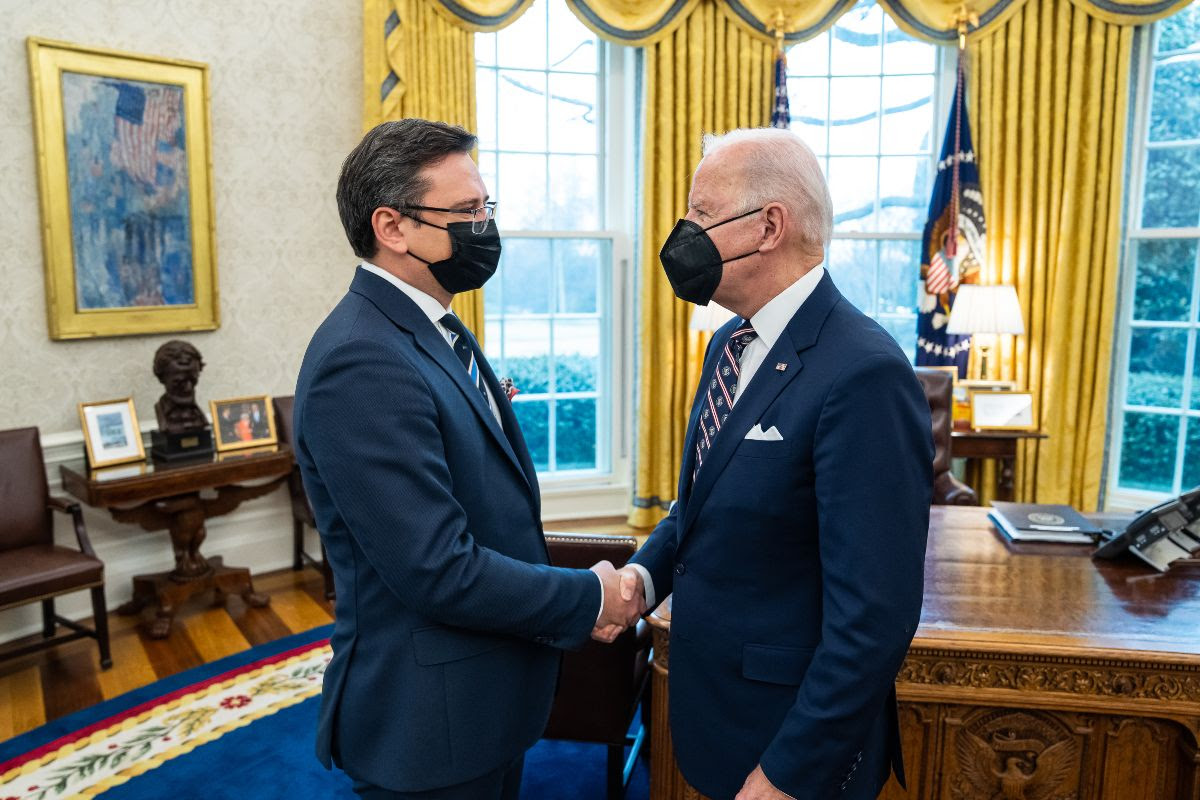
As Western efforts to defuse the crisis in Ukraine over the naked aggressive military moves taken by Russian President Vladimir Putin intensify, Ukrainian President Volodymyr Zelensky announced Tuesday night that he was calling up the country’s military reservists after the Russian Parliament signed off on approving Putin’s decision to send combat troops into Eastern Ukraine.
Western media and governments, particularly the U.S. and its NATO partners, have painted a grim picture of the state of affairs along Ukraine’s borders with President Biden declaring in a White House East Room press conference Tuesday that the U.S. would impose immediate sanctions after Putin ordered Russian troops deployed across the frontier.
Speaking with reporters afterwards, a senior administration official said; “Russia’s long-previewed invasion of Ukraine has now begun, and our response has also begun. Today, we responded swiftly and in a united fashion with our allies and partners. The speed and coordination of the response was historic. We announced our first tranche of sanctions in less than a day with allies and partners from the European Union, from the United Kingdom, Canada, Japan and Australia.”
The official added, “And let me be totally clear: No Russian financial institution is safe if this invasion proceeds. We are ready to press a button to take further action on the very largest Russian financial institutions, including Sperbank and VTB, which collectively hold almost $750 billion in assets — or more than half the total in Russia as a whole.
Third, together with our allies, we’ve also cut off the Russian government, the Russian Central Bank, and its sovereign wealth funds from U.S. financing. Europe has taken a very similar measure. That means the Kremlin can no longer raise money from the U.S. and Europe, and its new debt can no longer trade in U.S. or European markets.”
A spokesperson for Ukraine’s National Security and Defense Council said that in addition to calling up reservists, Zelensky will also enact a 30-day state of emergency which would impose curfews and restrict mass gatherings in certain regions and cities to include the second largest city in the country, Kharkiv, which lies 26 miles from the Russian border in Eastern Ukraine, “if necessary.”
Human rights activists and Western governments are also alarmed at the prospects of a Russian invasion. In a letter sent this week to the U.N. Office of the High Commissioner for Human Rights in Geneva, Amb. Bathsheba Nell Crocker, the U.S. Representative to the Office of the U.N. and other international organizations in Geneva wrote, in part:
“I would like to bring to your attention disturbing information recently obtained by the United States that indicates that human rights violations and abuses in the aftermath of a further invasion are being planned.
“These acts, which in past Russian operations have included targeted killings, kidnappings/forced disappearances, unjust detentions, and the use of torture, would likely target those who oppose Russian actions, including Russian and Belarusian dissidents in exile in Ukraine, journalists and anti-corruption activists, and vulnerable populations such as religious and ethnic minorities and LGBTQI+ persons.”
Americans officials have stated that the Russian governmental security and intelligence agencies have come up with “kill lists” of Ukrainians to be killed or detained as indicated in Crocker’s letter.
A spokesperson for the office of the Director of Information and Press Department of Ministry of Foreign Affairs of the Russian Federation, Maria Vladimirovna Zakharova, denied these claims in a phone call with the Washington Blade, labeling it propaganda Tuesday.
The majority of Ukrainians seem nonplussed at Western reaction to what they are terming “Biden’s war.” However, many of the LGBTQ activists are not fazed by the claims alleged in the ambassador’s letter and are prepared to defend their homeland, some of them also disputing that they would be facing arrest and ‘mortal danger.’
Taras Karasiichuk, a leader of the Ukrainian LGBTQ community in Kyiv, spoke with the Blade by phone Monday. Karasiichuk in 2012 had been viciously attacked by anti-LGBTQ Ukrainians opposed to his efforts as an activist for LGBTQ rights organization Gay Alliance Ukraine and also as the head of the Kiev Pride 2012 organizing committee. He had granted an interview to the Daily Beast in 2015 after unrelenting attacks and death threats caused him to flee to the U.S. seeking asylum.
“Right now I don’t see any possibility to come back because of security — all the threats we get because of our international campaign,” he said. “We get threats sent to our LGBT rights website, promises to punish us with Kalashnikovs. It’s difficult to say if they are really serious about the threats but after all the times I’ve been attacked I can’t really be sure.”
“I also get threats on social networks. My colleagues and I at the rights organization will even get threats sent to our personal cell phone. And on June 19 there was an attempt to attack me on my way home from the office — it was around 7 p.m. and I had to call a taxi and leave quickly,” Karasiichuk said to the Daily Beast at the time.
He later returned to Ukraine after spending a few years in the U.S., returning to an active role in LGBTQ advocacy to push for greater equity and rights for his fellow LGBTQ citizens.
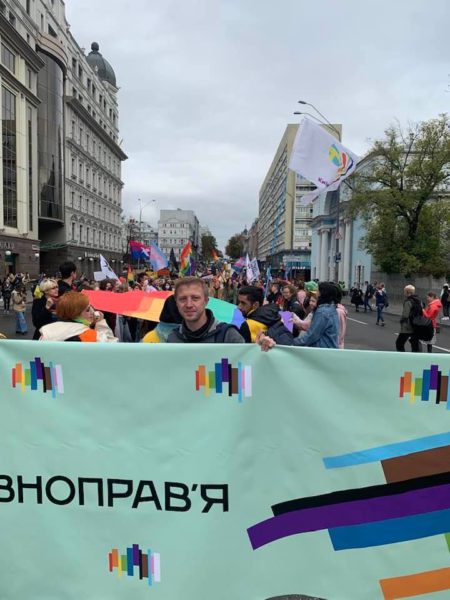
(Photo courtesy of Taras Karasiichuk)
In Monday’s phone call with the Blade, Karasiichuk strongly emphasized that there was no fear among the LGBTQ community in fact far from that. He said that he and every other LGBTQ Ukrainian would defend their homeland, their cities, and that they would support the armed forces.
Like many of his fellow citizens that the Blade spoke with, he execrated the Western response to the Russian actions, characterizing it as hyperbolic interference without merit. Several other Ukrainian LGBTQ activists put it more bluntly as “hashtag Biden’s War.” Karasiichuk said that Western people were not well informed as to the reality of life in Ukraine and especially in regards to the LGBTQ community in the country “should not impose their ideas of values.”
Another LGBTQ activist living in Poltava, a city in central Ukraine, which is also the capital city of the Poltava Oblast (province), who asked that he and his partner only be identified by their first names, told the Blade over this past weekend that the strength of his culture and country would defend against any Russian aggression.
Sergeii told the Blade that he and his partner Mykhailo felt safe and would defend their home, their city and their fellow Ukrainians. “Our flag is blue and yellow — not divided into many colors in this example,” he said. “We are all united in this effort. If we need fight then we will fight.”
His partner Mykhailo said that one only needed to see the progress LGBTQ people are making in Ukraine. “We showed strength as in September, over 6,000 people gathered to Kyiv for the March for Equality. This is our message.”
“This is made-up crisis: Biden’s and Putin’s wanting to finish the situation in Donbas,” Sergeii said referring to the ongoing war in Eastern Ukraine by Russian-backed separatists. “Everyone needs peace, to be peaceful in this manner and not provoke more fear, but still be willing to defend our homes,” he added.
Russian separatist forces of Donbas are the military formations affiliated with the pro-Russian breakaway regions in Ukraine called the Donetsk People’s Republic and Luhansk People’s Republic which Putin has now officially recognized. Those forces are designated as terrorist groups by the government of Zelensky.
Mykhailo pointed out that a vast majority of Ukrainian families were made of both Russian and Ukrainian parents or heritage but that above all was loyalty to Ukraine.
While there is a sense of anxiety among the Ukrainian LGBTQ community there is also quiet unified determination to defend the nation. Almost all also expressed hope that the NATO partners and others would find a peaceful solution to the crisis but without a continuing sense of exaggerated claims and allegations that would further inflame tensions.
Late Wednesday, the Kyiv Post reported that Zelensky, Polish President Andrzej Duda and Lithuanian President Gitanas Nausėda have signed a joint statement calling upon the international community to take resolute and far-reaching steps in response to yet another act of aggression committed by Russia against the sovereignty and territorial integrity of Ukraine.
“The presidents of Lithuania and Poland stand by Ukraine and fully commend and support its efforts to solve Russian-Ukrainian conflict by diplomatic and peaceful means. Ukraine deserves our strongest support of its European and Euro-Atlantic aspirations, which goes in line with the free will and choice of the Ukrainian nation,” reads the statement.
Eastern Europe
LGBTQ Ukrainians bear brunt of psychological toll amid ongoing war
Saturday marks two years since Russia invaded country
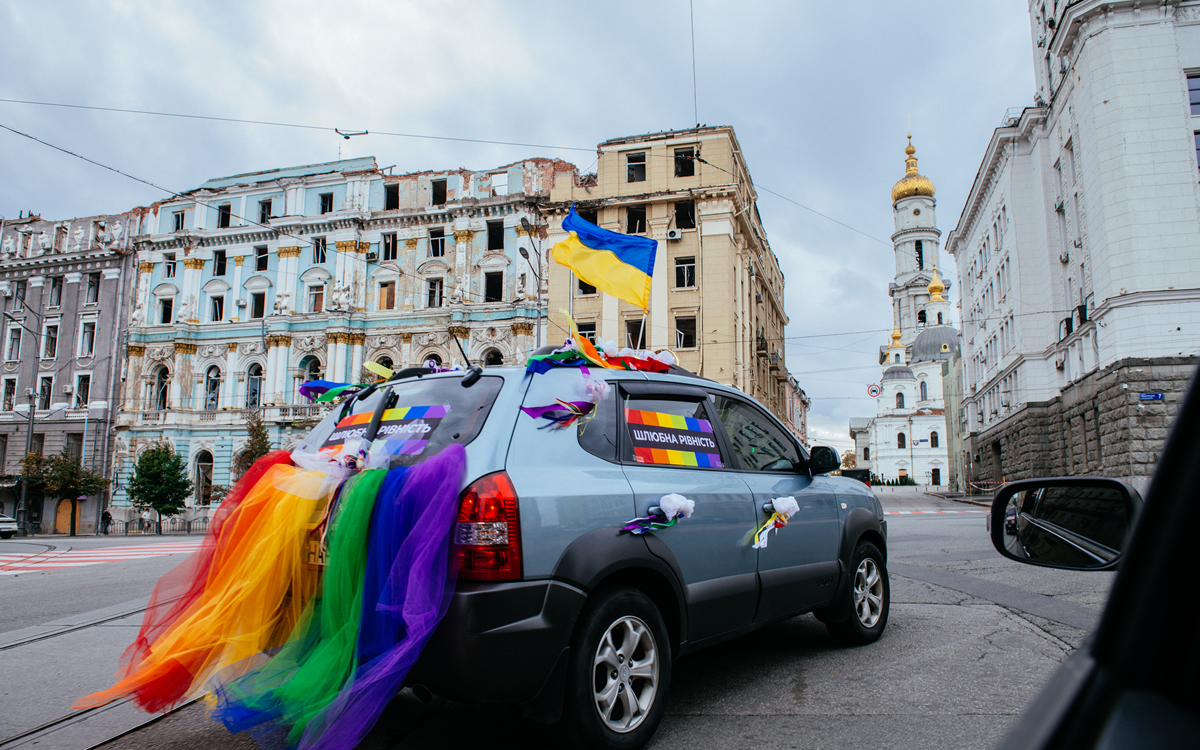
As Ukraine weathers Russian missile attacks and endures a harsh winter, the psychological consequences on its LGBTQ community are emerging as a distressing and often overlooked aspect of the conflict.
Recent reports from Human Rights First, based on their visits to the northeastern Ukrainian region of Kharkiv, shed light on the profound emotional impact experienced by LGBTQ individuals amid the sustained Russian aggression.
Saturday marks two years since Russia’s full-scale invasion of Ukraine began. Throughout this time, Human Rights First has sought to bring human rights into the heart of the discussion surrounding the conflict, offering support to human rights defenders, activist organizations, and individuals profoundly affected by the war.
Human Rights First last November initially surveyed Kharkiv to understand how communities were preparing for the harsh winter. Returning last month they found the LGBTQ community faced not only the physical challenges of extreme temperatures but also the hidden harm of severe psychological distress.
Human rights defenders on the forefront were documenting war crimes and supporting marginalized communities, including LGBTQ individuals. They emphasized the critical need for specialized psychological support within this community.
Vasyl Malikov, a key figure in Kharkiv-based LGBTQ NGOs Alliance.Global and Spectrum Women’s Association in Kharkiv, spoke about the increasing requests for psychological assistance and counseling.
Malikov highlighted the urgent need for both psychologists and a more comprehensive education about mental health and trauma issues.
“Some counseling can be done online, and it’s better than nothing, but what’s really needed is face-to-face time with a psychologist. Of course, that’s resource-intensive,” Malikov said, underscoring the unique challenges faced by the LGBTQ community.
Associate Professor Taras Zhvaniia, collaborating with Alliance.Global, shared insights into the growing demand for psychological support within the LGBTQ community. Initially addressing trauma in children, the scope expanded to include adults grappling with anxiety, depression and other emotional challenges related to the ongoing conflict.
Zhvaniia detailed the psychological struggles unique to the LGBTQ community, ranging from anxiety and panic attacks to specific fears such as reluctance to sleep in beds at home, avoiding bomb shelters and apprehension about routine activities during shelling.
Efforts to increase psychological knowledge for the general population are underway, yet the escalating demand for LGBTQ-focused support outpaces available resources. Human rights defenders have proposed measures, including funding for online counseling and visits by foreign psychologists, specifically tailored to address the psychological impact on the LGBTQ community.
The silent struggle faced by the LGBTQ community in Kharkiv and beyond necessitates international attention, according to Human Rights First. The organization added the lack of adequately trained psychologists raises concerns about the unaddressed psychological impact, underscoring the urgency for U.S. officials and the international community to comprehend and respond to the unique challenges faced by LGBTQ individuals in the midst of the ongoing conflict.
Eastern Europe
LGBTQ community in Kharkiv braces for another winter at war
Ukrainian city is 30 miles from Russian border
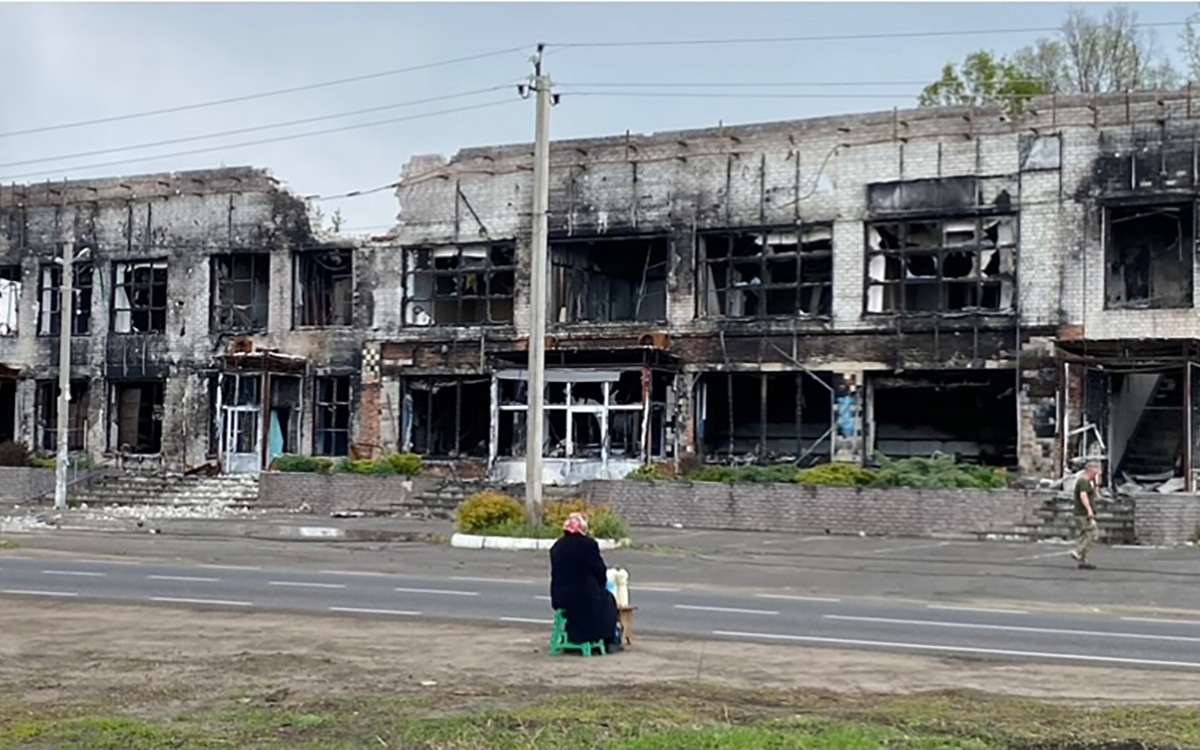
KHARKIV, Ukraine — Only 30 miles from the Russian border, Kharkiv is Ukraine’s second biggest city and was a key target of Russia’s invasion in February last year, when it was almost encircled.
I have been reporting regularly from Kharkiv since last year’s full-scale invasion, and the city is still often bombed by Russian missiles. United States government officials rarely come here because of the security situation. As temperatures plummet, Russia is targeting Ukraine’s heating infrastructure.
It hopes to make life unbearable for people in Ukraine’s cities and force another wave of mass movement out of Ukraine and into Poland and other European countries.
Attacks on Ukraine’s energy grid have begun, and some communities in the city have been particularly vulnerable since Russia’s invasion last year, and are facing a difficult winter.
Vasyl Malikov of the Kharkiv-based LGBTQI NGOs Alliance.Global and Spectrum Kharkiv has been distributing packages of hygiene goods, food and vouchers for humanitarian aid since last year. He helped to set up a new shelter for LGBTQI people and their relatives in the city.
“There are government shelters, and the authorities say they don’t discriminate against who uses them, but we know from lived experience that these official shelters aren’t always welcoming places for LGBTQI people. They feel vulnerable and are harassed there,” Malikov said. “We thought about setting up a shelter last year, but the situation seemed too uncertain and it wasn’t that easy to find premises, but we have gone ahead now and we can offer accommodation for up to 16 people to stay for up to three months.”
Some of those in the shelter are fleeing areas of conflict on the front lines, others have fled domestic violence, and others have been driven away by families who refuse to accept them. Some people, in Kharkiv for medical appointments, stay for days, others stay for weeks or months.
The shelter is a large apartment that has a kitchen and a large room where workshops and social events are held. It is on a block near a metro station which, Malikov says, is a useful place to run to in case of heavy bombardments.
Crucially, a new generator has arrived, which should heat the shelter during power outages. It’s a dual fuel model that can run on diesel or gas and costs around $2,000.
“This is a safe place for LGBTQI people and their families,” explains Malikov. “We shouldn’t have to set up our own facilities, the authorities should be doing this work, but we have to because they don’t.”
Other NGOs are also filling gaps that local authorities are failing to provide. The NGO Sphere has, since 2006 “been uniting women of Kharkiv, including lesbian and bisexual women.”
Tucked in a small office near the city center, some of Sphere’s activists described how their work has adapted to meet the challenges of the war.
“We’ve been providing aid for those forced to flee their homes because of the war,” says Yevheniia Ilinska, a long-standing member of the organization. “We’ve raised money from abroad — including from LGBTQ+ groups — to distribute basic supplies. We’ve been handing out clothes, including socks, and have provided some to our military.”
Sphere’s activists say that beyond its obvious damage and destruction to the city, the war is causing “a social revolution:” many men are away from their homes fighting in the military, and many family dynamics are changing dramatically.
The activists fear a spike in domestic violence when soldiers return home, a phenomenon witnessed in other countries.
“The full-scale war significantly aggravates some of the problems that existed before, including gender-based domestic and sexual violence, and discrimination at work,” Sphere notes on its website.
The war has also helped change some attitudes towards LGBTQ+ people in Ukraine. Last September, when the dangers from rocket attacks made an open-air parade impossible, Sphere helped organize a successful Pride event in the city’s metro system.
“We dressed wearing national symbols and LGBT flags,” says Ilinska. “And the public reception was very positive.”
The reaction is more evidence of a positive shift since last year’s invasion in public attitudes towards LGBTQ+ people, in part because the community’s contribution to the war effort is increasingly seen and valued. Hopes are high that Ukraine will soon legalize same-sex civic partnerships, and eventually same-sex marriages.
But for now, the cold is an immediate challenge. Sphere is raising funds to offer locals a safe place so that “in the event of rocket attacks and power outages, LGBTQ+ people will be able to stay warm indoors, have a hot drink, take a shower, and do laundry,” says Ilinska.
“We’re constantly adapting our work,” says Ilinska. “Adapting our advocacy and our public events, and our projects on targeting humanitarian aid. Kharkiv is changing and so are we, we have to react to this dramatic crisis, to the invasion, and we’re proving that we and our community can resist,” she said.
For more, see Human Rights First’s new report, Ukraine’s Winter War, written by Maya Fernandez-Powell and myself.
Eastern Europe
Transgender soldier from US named Ukrainian military spokesperson
Sarah Ashton-Cirillo was journalist before she enlisted
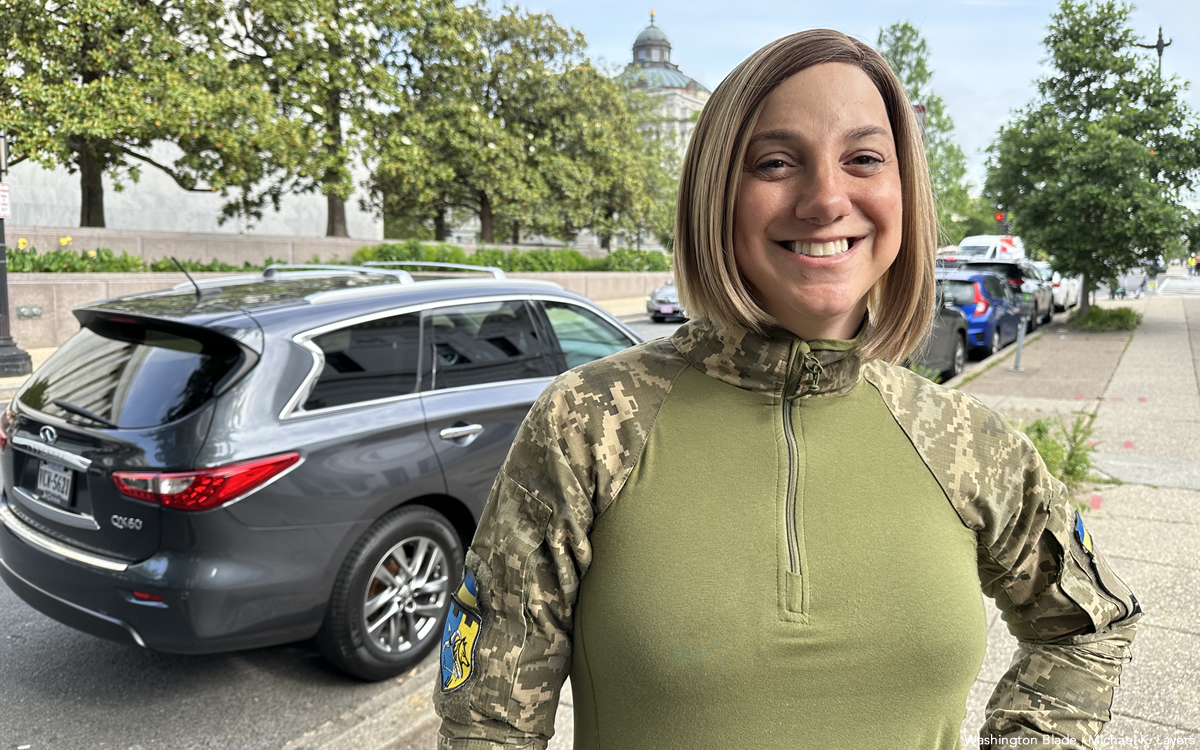
The Armed Forces of Ukraine have named a transgender soldier from the U.S. as one of its English-speaking spokespeople.
The Kyiv Post, an English-language newspaper, last week in a tweet noted Sarah Ashton-Cirillo “has become one of the speakers for the Defense Forces.” Deputy Defense Minister Hanna Malyar is among those who praised Ashton-Cirillo.
“Sara informs the English-speaking audience — she objectively covers the events of the Russian-Ukrainian war, debunks Russian fakes and propaganda,” said Malyar, according to the Kyiv Post. “Sarah’s audience reach on Twitter alone was 28.3 million users. So, the enemies get excited on hateful social networks, of course. However, this has only increased Sarah’s audience.”
Ashton-Cirillo was a journalist when she began to cover the Armed Forces of Ukraine’s Kharkiv Defense Forces at the beginning of Russia’s war against the country in 2022. She eventually enlisted, and a commander from the Defense Ministry on Jan. 31, 2023, facilitated her transfer to the unit’s 209th Batallion of the 113th Brigade.
Ashton-Cirillo, who was born in New York, was working as a senior combat medic in a trench near Kreminna in eastern Ukraine on Feb. 23, 2023, when shrapnel from an enemy artillery shell wounded her. Ashton-Cirillo suffered injuries to her right hand and to her face, and her fellow soldiers had to wait seven hours to evacuate her. Ashton-Cirillo eventually received treatment for her injuries in Kharkiv, Ukraine’s second-largest city that is roughly 130 miles northwest of Kreminna.
The Washington Blade spoke with Ashton-Cirillo in May while she was in D.C.
“The big key there was I wasn’t able to take any painkiller by staying in the trench because I was still technically in battle,” she recalled. “Seven hours after my injury, I finally got to a hospital.”
Ashton-Cirillo on Tuesday told the Blade her “new role within the Armed Forces of Ukraine is a position that has been earned due to my performance on the physical and informational battlefields.”
“What this means is that in today’s Ukraine being a part of the LGBTQ community is neither a benefit nor hindrance, but simply an accepted part of whom a person is,” she said. “The vocal support shown by LGBTQ groups in Ukraine, such as Gender Stream, Kyiv Pride and Ukraine Pride, upon news of this taking place, along with the statement of confidence in me issued by the Ukrainian Ministry of Defense and Deputy Defense Minister Hanna Maliar, made me understand that this battle for the country’s liberation is not about tolerance or acceptance for any one group but freedom and liberty for all Ukrainians.”
-

 District of Columbia2 days ago
District of Columbia2 days agoReenactment of first gay rights picket at White House draws interest of tourists
-

 District of Columbia2 days ago
District of Columbia2 days agoNew D.C. LGBTQ+ bar Crush set to open April 19
-

 Arizona2 days ago
Arizona2 days agoAriz. governor vetoes anti-transgender, Ten Commandments bill
-

 Africa4 days ago
Africa4 days agoUgandan activists appeal ruling that upheld Anti-Homosexuality Act

